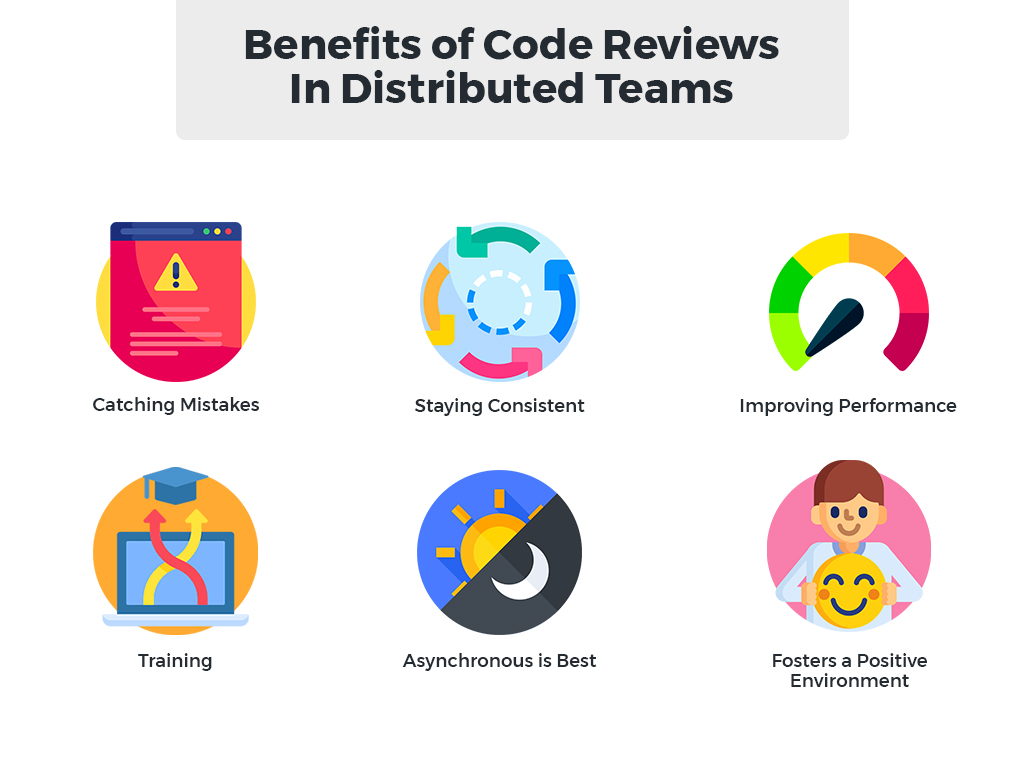In the world of distributed software development, code reviews stand out as a crucial quality assurance practice, often surpassing even Test-Driven Development (TDD) in effectiveness. But why are they so important?
Consider this: IBM research indicates that code reviews can detect an impressive 60% to 65% of defects, outperforming many testing methodologies. Even more striking, every hour invested in code reviews can potentially save up to 33 hours in future maintenance costs. For remote teams juggling complex codebases across time zones, these numbers aren’t just interesting—they’re game-changing.
Code reviews serve multiple critical functions:
- Early bug detection and prevention
- Ensuring code quality and consistency across distributed teams
- Knowledge sharing and skill improvement among team members
- Maintaining architectural integrity in large-scale projects
This process also helps team members learn from each other, boosting skills and team unity.
In this article, we’ll explain what code review is, explore its advantages, and guide you through essential steps to make the process more effective with the right tools.
What Is Code Review?
A code review is a thorough check of software source code aimed at spotting bugs and assessing code quality. This process enhances:
- coding practices,
- detects errors,
- exposes vulnerabilities
- uncovers any hidden malware.
It’s especially beneficial for developers geographically distributed, where Agile and remote workers often handle tasks autonomously based on their expertise. Code reviews ensure efficient task and skill integration, reducing the chances of overlap or misunderstandings in such teams.
Benefits of Code Reviews In Distributed Teams
We believe that code reviews are even more important when you are managing a remote dev team. Here’s why:

1. Detect Errors and Bugs
In co-located settings, developers can easily seek help from colleagues. However, in remote software teams across different time zones, addressing issues becomes more challenging.
Code reviews offer a solution that allows knowledge sharing asynchronously. This way, developers can request assistance with their schedules, accommodating different time zones and work-life balances.
2. Consistent Coding Standards
Coding standards ensure consistency, making maintenance easier. In physical offices, shared spaces and cultural norms bolster this consistency.
For remote teams, the challenge is balancing this consistency with the creativity that comes from diverse backgrounds. Code reviews play a crucial role in maintaining standards while fostering creative and unique problem-solving approaches within the team.
3. Enhancing Efficiency with Collaborative Review
In remote teams, code reviews bring an extra layer of scrutiny, often from more experienced eyes, leading to optimized development practices.
Reviewing code remotely ensures maximal efficiency and discourages redundant coding efforts, saving time and streamlining project progression.
Research by SmartBear found that code reviews can reduce post-release bugs by up to 80%, highlighting their cost-effectiveness.
4. Diverse Learning Through Peer Review
While traditional office-based teams might receive uniform training, remote teams bring varied educational backgrounds and methodologies. Code reviews in such teams become a platform for mutual learning, where both reviewer and reviewee gain insights.
This process helps to create a best practice, which can be included in your standards- and, in the long run, improve the quality of your code for the whole team and enhance overall team velocity. The value of fostering a mentorship culture within your team cannot be overstated.
5. Asynchronous is Best
Code review is a meticulous task, often leading to fatigue and oversights as you already experienced. Studies by Cisco determined that the best amount of code to review is 200-400 lines or around one hour time for each review.
For efficiency in remote settings, divide the review workload among team members, allocating an hour per day each. Tools like Atlassian’s Crucible can be instrumental in managing these reviews. This approach not only speeds up the process but also fosters stronger team dynamics.
As team members appreciate each other’s skills through reviews, it builds trust – a crucial element for remote team cohesion.
6. Fosters a Positive Environment
Of course, it’s possible to give a bad code review. There are thousands of ways when a bad review can happen. For example, the comments imply a criticism of the coder, rather than the code. Or, the reviewer decides to be a back-seat coder and criticizes perfectly good code just because the colleague follows another method. That won’t help.
So, your team must have a positive environment for constructive critique. Everyone needs to be open to having their work reviewed and to deal positively with suggestions of change. A team that is thoughtful about the feedback it gives and open to receiving it will grow and learn, and that can only positively impact your end product.
To make sure that your code reviews solve problems rather than cause them, provide some guidance on how the process should happen. Firstly, ensure that the original developer revisits their code and comments on anything they’ve done that varies from standard, explaining why (bonus, your code then becomes easier to edit in the future) before it goes for review.
Secondly, give your reviewers suggestions on how to approach the review. A simple change like asking, ‘What made you do things this way?’ rather than stating, ‘You didn’t follow standards,’ makes for a better experience all around. Your team will work better together, for being able to have frank discussions without causing or taking offense.
How Does Code Review Work for Remote Teams?
Any team can benefit from code reviews, regardless of the type of business or field. For remote teams, however, setting up a code review process can bring countless benefits to the workflow. When the team is decentralized, with this process your developers can work on the same tasks sharing the same knowledge – rather than waiting for the only person able to get the job done.
You won’t be surprised to hear that the key to making it happen is communication. Solid communication is the foundation of remote teams. We won’t ever stop saying this.
So, when you introduce your code review process, integrate each step in your current workflow and, more importantly, don’t forget to document.
Take into account these steps:
- Establish a clear workflow including the code review in your current workflow;
- Document and give as much as detailed information you can to support the code review process.
- Arrange regular meetings to align on goals and details, using screen share, whiteboard, or team-based tools.
- Adapt and adjust the process considering bottlenecks, necessary updates, and feedback.
- Complete the code review process only upon approval.
To ensure each of these steps works properly, you must ensure a solid communication process. Don’t rely on email. Instead, establish clear guidelines, clearly display different availability schedules, and set up an internal reporting system.
Step-by-Step Guide for Conducting Effective Code Reviews
There are 8 primary strategies to perform code review in remote teams:
1. Over-the-Shoulder Reviews (Virtual)
Conducted via video calls or screen sharing, this method involves a senior developer reviewing code in real-time, and offering immediate feedback and suggestions. It fosters an informal yet productive dialogue, replicating an in-office experience.
2. Email Pass-Around with Integrated Tools
Your team of developers can send code changes via email linked with version control systems, triggering discussions. This method is evolving with remote collaboration tools, allowing for more seamless conversations and change tracking.
3. Remote Pair Programming
Implement real-time, collaborative coding sessions with compatible developer pairs for immediate feedback.
4. Tool-Assisted Reviews
Leverage specialized code review tools for efficient organization, communication, and performance metrics.
A tool-assisted code review process relies on specialized tools to speed up the process of code review. Specifically, these tools help:
- Organizing and displaying the updated files with edits.
- Facilitating the exchange between reviewers and developers.
- Assessing the efficacy of the review process with metrics.
5. Asynchronous Review Scheduling
Make the habit of setting time slots for reviews, and accommodating different time zones for continuous feedback.
Use tools like shared calendars or scheduling software to ensure everyone knows when to review and provide feedback, maintaining a continuous, non-disruptive workflow.
6. Code Annotation and Commenting
Encourage team members to add detailed comments and annotations directly in the code or review platform. This should include explanations for suggested changes, questions about specific code segments, and general observations, facilitating clearer understanding and communication.
7. Follow-Up Meetings
After the initial review, schedule short meetings to discuss significant or complex issues that emerged. These meetings should focus on resolving misunderstandings, agreeing on solutions, and planning implementation strategies, ensuring everyone is on the same page.
8. Documentation of Best Practices:
Create and regularly update a document or wiki with best practices, common pitfalls, and lessons learned from previous code reviews. This resource should be easily accessible and serve as a guide for improving consistency and efficiency in future code reviews.
These eight strategies work with collaborative tools for remote development teams.
Recommended Tools for Code Reviews in Remote Teams
When managing remote teams, choosing the right code review tools is crucial for effective collaboration. Here are some top recommendations:
- GitHub: Offers an intuitive platform for code review with features like pull requests, issue tracking, and team management.
- GitLab: Provides a comprehensive DevOps platform, facilitating code reviews within a broader suite of tools.
- Bitbucket: Ideal for teams already using Atlassian products, offering seamless integration with Jira and Trello.
- Review Board: A web-based tool that supports pre-commit and post-commit reviews.
- Phabricator: A suite of open-source tools, including differential code review, repository hosting, and more.
Each of these tools has unique features tailored to different team needs and workflows. By integrating these tools into your remote team’s operations, you can streamline the code review process, enhance collaboration, and maintain high-quality code standards.
Conclusion
Implementing a structured and detailed approach to code reviews in remote teams is crucial for maintaining high-quality software development.
With the right practices, you can ensure that your remote development teams can effectively collaborate, learn from each other, and continuously improve their code quality and development processes despite the physical distances.
And as always, if you need help with how well your team performs or whether you made good recruiting decisions or not, we’re here for you. We spend our days finding the perfect candidates for remote developer roles. If you’re looking to add a new team member to your distributed team, get in touch.




